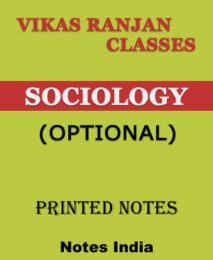SOCIOLOGY OPTIONAL PRINTED NOTES 2017 BY VIKAS RANJAN
About Vikash Ranjan (Author, Fundamentals of Sociology & Applied Sociology)
Mr. Vikash Ranjan has a long experience in the civil services guidance. A good number of aspirants have already proven his Teaching Excellence by getting good ranks in the Civil Services Examination under Mr. Ranjan’s Guidance.
The precise & focused presentation of his Lectures and Class notes would be more effective than any other material provided by coaching especially in the changed scenario. His aim is to provide Right Approach along with Right kind of Notes and Effective Strategy. Vikash Ranjan has authored many books.
Sociology optional printed notes by vikas ranjan 4 booklets in covered below syllabus accordingly UPSC:
PAPER – I ( FUNDAMENTALS OF SOCIOLOGY )
1. Sociology – The Discipline:
(a) Modernity and social changes in Europe and emergence of sociology.
(b) Scope of the subject and comparison with other social sciences.
(c) Sociology and common sense.
2. Sociology as Science:
(a) Science, scientific method and critique.
(b) Major theoretical strands of research methodology.
(c) Positivism and its critique.
(d) Fact value and objectivity.
(e) Non- positivist methodologies.
3. Research Methods and Analysis:
(a) Qualitative and quantitative methods.
(b) Techniques of data collection.
(c) Variables, sampling, hypothesis, reliability and validity.
4. Sociological Thinkers:
(a) Karl Marx- Historical materialism, mode of production, alienation, class struggle.
(b) Emile Durkheim- Division of labour, social fact, suicide, religion and society.
(c) Max Weber- Social action, ideal types, authority, bureaucracy, protestant ethic and the
spirit of capitalism.
(d) Talcolt Parsons- Social system, pattern variables.
(e) Robert K. Merton- Latent and manifest functions, conformity and deviance, reference
groups
(f) Mead – Self and identity.
2
5. Stratification and Mobility:
(a) Concepts- equality, inequality, hierarchy, exclusion, poverty and deprivation
(b) Theories of social stratification- Structural functionalist theory, Marxist theory, Weberian
theory.
(c) Dimensions –Social stratification of class, status groups, gender, ethnicity and race.
(d) Social mobility- open and closed systems, types of mobility, sources and causes of
mobility.
6. Works and Economic Life:
(a) Social organization of work in different types of society- slave society, feudal society,
industrial /capitalist society.
(b) Formal and informal organization of work
(c) Labour and society.
7. Politics and Society:
(a) Sociological theories of power
(b) Power elite, bureaucracy, pressure groups, and political parties.
(c) Nation, state, citizenship, democracy, civil society, ideology.
(d) Protest, agitation, social movements, collective action, revolution.
8. Religion and Society:
(a) Sociological theories of religion.
(b) Types of religious practices: animism, monism, pluralism, sects, cults.
(c) Religion in modern society: religion and science, secularization, religious revivalism,
fundamentalism.
PAPER – II ( INDIAN SOCIETY : STRUCTURE AND CHANGE )
A. Introducing Indian Society:
(i) Perspectives on the study of Indian society:
(a) Indology (GS. Ghurye).
(b) Structural functionalism (M N Srinivas).
(c) Marxist sociology ( A R Desai).
(ii) Impact of colonial rule on Indian society :
(a) Social background of Indian nationalism.
(b) Modernization of Indian tradition.
(c) Protests and movements during the colonial period.
(d) Social reforms
B. Social Structure:
(i) Rural and Agrarian Social Structure:
(a) The idea of Indian village and village studies-
(b) Agrarian social structure –
-evolution of land tenure system,
-land reforms.
4
(ii) Caste System:
(a) Perspectives on the study of caste systems: GS Ghurye, M N Srinivas, Louis Dumont,
Andre Beteille.
(b) Features of caste system.
(c) Untouchability – forms and perspectives
(iii) Tribal communities in India:
(a) Definitional problems.
(b) Geographical spread.
(c) Colonial policies and tribes.
(d) Issues of integration and autonomy.
(iv) Social Classes in India:
(a) Agrarian class structure.
(b) Industrial class structure.
(c) Middle classes in India.
(v) Systems of Kinship in India:
(a) Lineage and descent in India.
(b) Types of kinship systems.
(c) Family and marriage in India.
(d) Household dimensions of the family.
(e) Patriarchy, entitlements and sexual division of labour.
(vi) Religion and Society:
(a) Religious communities in India.
(b) Problems of religious minorities.
C. Social Changes in India:
(i) Visions of Social Change in India:
5
(a) Idea of development planning and mixed economy.
(b) Constitution, law and social change.
(c) Education and social change.
(ii) Rural and Agrarian transformation in India:
(a) Programmes of rural development, Community Development Programme, cooperatives,
poverty alleviation schemes.
(b) Green revolution and social change.
(c) Changing modes of production in Indian agriculture .
(d) Problems of rural labour, bondage, migration.
(iii) Industrialization and Urbanisation in India:
(a) Evolution of modern industry in India.
(b) Growth of urban settlements in India.
(c) Working class: structure, growth, class mobilization.
(d) Informal sector, child labour
(e) Slums and deprivation in urban areas.
(iv) Politics and Society:
(a) Nation, democracy and citizenship.
(b) Political parties, pressure groups , social and political elite.
(c) Regionalism and decentralization of power.
(d) Secularization
(v) Social Movements in Modern India:
(a) Peasants and farmers movements.
(b)
Lorem ipsum dolor sit amet, consetetur sadipscing elitr, sed diam nonumy eirmod tempor invidunt ut labore et dolore magna aliquyam erat, sed diam voluptua. At vero eos et accusam et justo duo dolores et ea rebum. Stet clita kasd gubergren, no sea takimata sanctus est Lorem ipsum dolor sit amet. Lorem ipsum dolor sit amet, consetetur sadipscing elitr, sed diam nonumy eirmod tempor invidunt ut labore et dolore magna aliquyam erat, sed diam voluptua.
At vero eos et accusam et justo duo dolores et ea rebum. Stet clita kasd gubergren, no sea takimata sanctus est Lorem ipsum dolor sit amet. Lorem ipsum dolor sit amet, consetetur sadipscing elitr.
Sed diam nonumy eirmod tempor invidunt ut labore et dolore magna aliquyam erat, sed diam voluptua. At vero eos et accusam et justo duo dolores et ea rebum. Stet clita kasd gubergren, no sea takimata sanctus est Lorem ipsum dolor sit amet.
Related Products
Vision Ias - GS+ Ethics Essay - Topper Copy - By Aishwaryam
Lorem ipsum dolor sit amet, consetetur sadipscing elitr, sed diam nonumy eirmod tempor invidunt ut l..
Ghatna Chakra - General Studies Preview - State Based Questi
Lorem ipsum dolor sit amet, consetetur sadipscing elitr, sed diam nonumy eirmod tempor invidunt ut l..
Drishti Ias - Current Affairs Consolidation Monthly Magazine
Lorem ipsum dolor sit amet, consetetur sadipscing elitr, sed diam nonumy eirmod tempor invidunt ut l..
Vision Ias - GS Paper I+IV & Essay - Topper Copy - By Aditya
Lorem ipsum dolor sit amet, consetetur sadipscing elitr, sed diam nonumy eirmod tempor invidunt ut l..
Pinnacle Publications - Static GK Theory +MCQ - Chapter Wise
Lorem ipsum dolor sit amet, consetetur sadipscing elitr, sed diam nonumy eirmod tempor invidunt ut l..
Insights IAS - Insta PT - Exclusive Science & Technology 202
Lorem ipsum dolor sit amet, consetetur sadipscing elitr, sed diam nonumy eirmod tempor invidunt ut l..
Insights IAS - Insta PT - Exclusive Polity 2024 - English Me
Lorem ipsum dolor sit amet, consetetur sadipscing elitr, sed diam nonumy eirmod tempor invidunt ut l..
Insights IAS - Insta PT - Exclusive International Relations
Lorem ipsum dolor sit amet, consetetur sadipscing elitr, sed diam nonumy eirmod tempor invidunt ut l..
Insights IAS - Insta PT - Exclusive Government Schemes 2024
Lorem ipsum dolor sit amet, consetetur sadipscing elitr, sed diam nonumy eirmod tempor invidunt ut l..
Insights IAS - Insta PT - Exclusive Environment 2024 - Engli
Lorem ipsum dolor sit amet, consetetur sadipscing elitr, sed diam nonumy eirmod tempor invidunt ut l..











